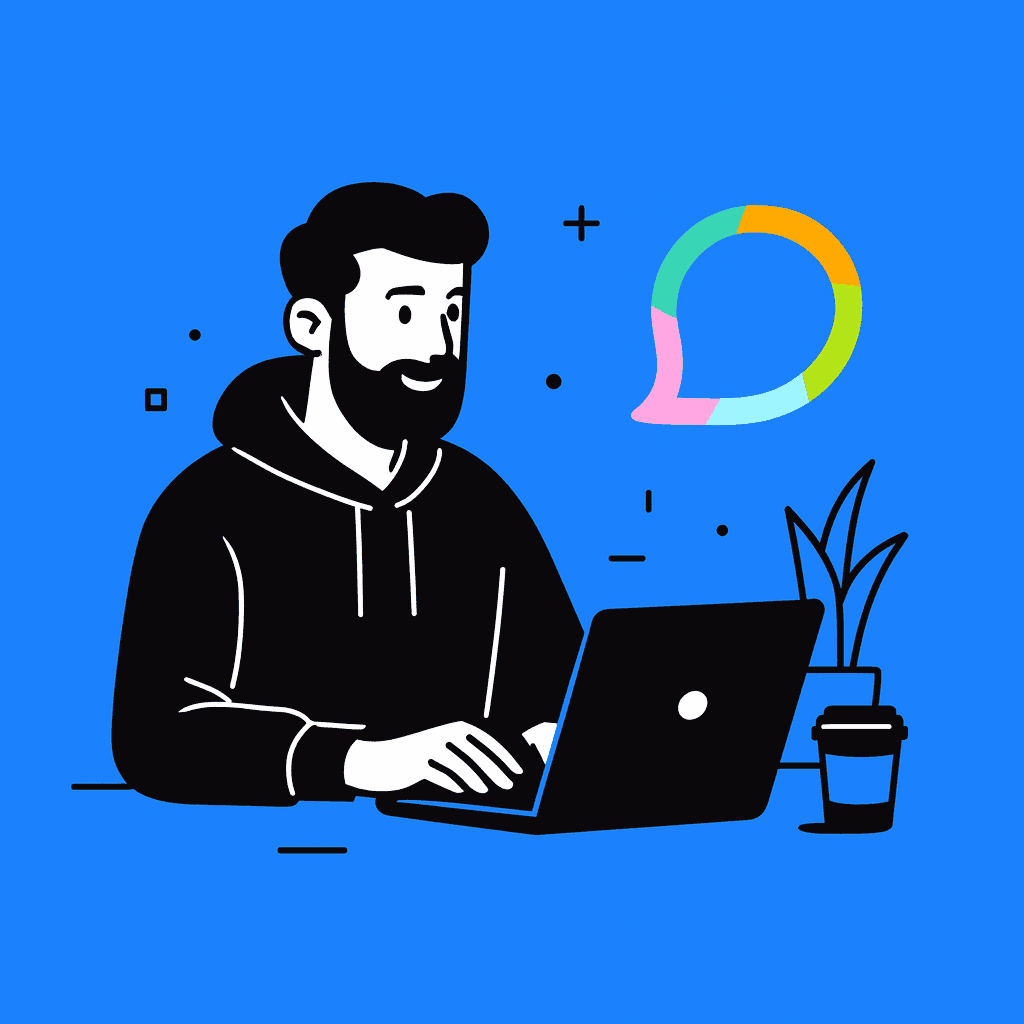Email is the most important and most popular communication channel in the business environment. Most CRMs are (exclusively) focussed on email. In this blog post, we shed light on
- what a WhatsApp CRM is
- how a WhatsApp CRM works
- how to install and use a WhatsApp CRM
- when you should consider a WhatsApp CRM.
- best practices for professional WhatsApp communication
- and much more.
Chatarmin is the leading WhatsApp CRM from Austria
Email communication with customers no longer works as efficiently as it used to in the following industries:
- D2C eCommerce: Customers are inundated with promotional emails and no longer read or respond to promotional emails from brands
- B2B Sales & Hospitality: Even professional relationships cannot be maintained by email. Mass emails from agencies and SaaS companies flood professional inboxes, making professional dialogue almost impossible.
- Trade: Print advertising consumes up to 90% of advertising budgets in the DACH region. At the same time, paper and print are more expensive than ever before due to global supply chain problems and raw material prices. At the same time, people in urban areas no longer want flyers. Print cannot be analysed and tracked, and is also an environmental sin.
- Hotel industry: The pressure from booking platforms such as "Booking" or "Airb'n'b" is so great that many hotels and hotel chains no longer do their own marketing. This dependency is a problem
We could continue this list indefinitely, but will limit ourselves here to sectors in which we have active customers who tell us about their problems and challenges on a daily basis.

In December 2022, spam emails accounted for around 45.2 per cent of all email traffic worldwide.
Not only email, but also other communication channels are now hyper-inefficient:
- Phone & landline: People hardly ever make phone calls these days, especially young people are no longer used to doing so. Personal contact on a professional level is increasingly being cancelled.
- Fax: Most companies no longer even operate a fax machine.
- Social Media: Running B2B social media successfully is extremely difficult. Fake gurus and dubious agencies create mistrust on Youtube, Instagram, Tik Tok and Co. The algorithms are not designed for B2B performance, so it is extremely difficult to acquire B2B and B2C customers profitably and/or sustainably on social media.
- LinkedIn spam: Even though LinkedIn has established itself as THE social media for the world of work, most private inboxes are now unusably spammed by mass sales automation.
- SMS: Even though iMessage is widespread in the USA and SMS is still used in markets such as Scandinavia. In the DACH region and in developing countries, SMS plays no role in people's everyday lives.
 .
.
WhatsApp is the most popular app and the best-known messenger in the world, and the trend is constantly on the rise.
More and more companies are therefore looking for an efficient way to
- new customer acquisition
- Customer loyalty
A WhatsApp CRM should be able to do both. We'll explain how this works in the following lines.
Advantages of a WhatsApp CRM tool
First things first: We won't be explaining all the benefits of WhatsApp marketing and WhatsApp marketing best practices in this WhatsApp CRM blog post. We've done that extensively elsewhere and will also link you to the resources. You can find out how to create a WhatsApp newsletter here. So what are the advantages of a WhatsApp CRM tool?
- Better KPIs than email or other communication channels
- Easy to use
- Perfect integration with other tools such as Klaviyo, Shopify, Stripe, Mailchimp & Co.
- Automations, just like you are used to from other CRMs
- GDPR-compliant and scalable WhatsApp is still young, NOW you are still an "early adopter"
- Coordination with email for the ideal communication duo

If you use a WhatsApp CRM for your corporate communications, you are a digital pioneer in most industries
We hope that you now have an overview of the possibilities and advantages of a WhatsApp CRM. Let's now take a look at the four most important functions of a WhatsApp CRM:
- Lead generation and lead enrichment
- Automations and flows
- Campaign and newsletter dispatch
- Integrations with software infrastructure
Lead generation and lead enrichment with a WhatsApp CRM
"How do I get my customers' mobile phone numbers?" - We were asked this question almost every day, especially in the early days of Chatarmin. The answer is simple:
Using a WhatsApp Link Generator - which Chatarmin provides in the WhatsApp CRM, of course - you can easily acquire
- the WhatsApp user names (95% of which are first name or first name and surname) &
- the mobile phone number
of your customers. This works simply by "link-clicking", as you can see in the example of "waterdrop®" and the mobile "pop-up leads":
 .
.
By clicking on the CTA in the mobile pop-up, waterdrop® secures the customer's WhatsApp username and mobile phone number with a "one-click".
Mobile pop-up lead generation via WhatsApp one-click performs around 50% better than the usual lead generation form filling, which is not a user-friendly journey for mobile traffic on tablets and smartphones.

Comparison of email and WhatsApp lead generation for mobile website traffic
Through lead enrichment in the WhatsApp welcome flow, which you can easily create using the WhatsApp CRM Chatarmin, you will receive the email address of these leads yourself. This not only gives you more leads, but also higher quality leads.
Another example is Chatarmin customer BAUHAUS, a large DIY and furniture retail chain in Austria.
 .
.
BAUHAUS generates leads through the WhatsApp CRM Chatarmin by distributing the Chaststart link via QR code.
Every WhatsApp CRM should offer you the option of creating an infinite number of chatstart links. This allows you to build your WhatsApp list in your WhatsApp CRM in a simple, GDPR-compliant and scalable way. This is how you "collect your customers' mobile phone numbers".
If you now want to enrich these leads, it makes sense to query the following in the "welcome automation" that you create with your WhatsApp CRM:
- Product preferences
- Age of the customer
- Gender of the customer
- Customer interest
- Birthday of the customer
This allows you to segment in your WhatsApp CRM and only send relevant offers and information to the right target group.

WhatsApp lead gen and lead enrichment from the Austrian FinTech "froots"
We hope that you now have a feel for what WhatsApp lead gen and WhatsApp lead enrichment looks like and could look like in a WhatsApp CRM. If you still have questions, you can find more information about WhatsApp strategy in lead gen and lead enrichment here.
Automations and flows in the WhatsApp CRM
Every reasonable WhatsApp CRM should offer you the option of creating "flows" - also known as "automations". This is what such a flow looks like in our WhatsApp CRM Chatarmin:
WhatsApp CRM flow of a Chatarmin customer
You can trigger these on different events:
- "Buzzwords", i.e. signal words that are included in the chat start link
- API webhooks from your CRM
- API webhooks from your shop system
- WhatsApp activity of your customers
- Other activities of your customers
For example, Chatarmin offers the option of using custom endpoints from your unique API as flow triggers. The best way to find out how this works is in a personal conversation.
Flows let you:
- Collect information from your customers automatically
- "tag" your customers and thus later segment and target them
- enrich leads by asking for birthdays, preferences, interests or (email) addresses
- give customers the data sovereignty to unsubscribe from WhatsApp again
- and much more
If you have other MarTech system infrastructure that you use, it can optionally be very important that the system communicates with your WhatsApp CRM. This gives you centralised data sovereignty, but still prevents data silos and ensures transparent information flows between your relevant software infrastructure.
In eCommerce, for example, this is provided by our Shopify & Klaviyo integration.
But such high data quality and data permeability is also possible for you and your industry!
WhatsApp campaigns and WhatsApp newsletter dispatch
Your WhatsApp CRM shouldn't just let you collect and enrich customer data. No, you also want and should do something with it. We are not going to create a complete guide to creating and sending a WhatsApp newsletter here. But you should be aware that:
- WhatsApp sending is very similar to email newsletters
- you have to master similar operational aspects in your WhatsApp CRM as in your email CRM
- WhatsApp via WhatsApp CRM is GDPR-compliant and scalable. Chatarmin proves this.
Once you have built up a customer list, you want to use WhatsApp campaigns to target them. These should:
- be infrequent but highly relevant
- match the messaging of your usual sales and marketing channels
- Be segmented according to your customers' interests, preferences and profiles
We have linked you to a complete WhatsApp Newsletter Best Practices Guide We will now turn our attention to choosing the right WhatsApp CRM for you.
Choosing the right WhatsApp Business account for your WhatsApp CRM
To create a WhatsApp business account, you need a (mobile or landline) phone number. You also need a credit card to cover the WhatsApp costs. Once you have fulfilled these two requirements, you can start choosing your ideal WhatsApp CRM.
If you don't know why you need all this, here is a comparison table of "WhatsApp Private", "WhatsApp Business" and the "WhatsApp Business Platform", on the basis of which WhatsApp CRMs such as Chatarmin are programmed.
| Feature | WhatsApp Business App | WhatsApp Business Premium | WhatsApp Business Platform | |
|---|---|---|---|---|
| Monthly costs | Free | Free | €99.00 + META costs | |
| Free conversations | ✅ | ❌ | ❌ | |
| GDPR compliance | ❌ | ❌ | ❌ | |
| Automations and journeys | ❌ | ❌ | ✅ | |
| Support agents and ticketing | ❌ | ❌ | ✅ | |
| WhatsApp mobile app | ✅ | ✅ | ❌ | |
| Dashboards and analytics | ❌ | ❌ | ✅ | |
| Custom logins and 2FA | ❌ | ❌ | ✅ | |
| Documentation and segments | ❌ | ❌ | ✅ | |
| API integrations | ❌ | ❌ | ✅ | |
| WhatsApp desktop users | 4 | 10 | Infinite | |
| Multi-Messenger | ❌ | ❌ | ✅ | |
| Klaviyo WhatsApp Integration | ❌ | ❌ | ❌ | ✅ |
| Shopify WhatsApp Integration | ❌ | ❌ | ❌ | ✅ |
| Shopware WhatsApp Integration | ❌ | ❌ | ❌ | ✅ |
Now that you know why you need to set up a "WhatsApp Business Platform Account" in your META Business Suite (don't worry - we'll do it for you!), feel free to ask yourself these questions:
- when do I want to start using a WhatsApp CRM?
- why do I want to start with a WhatsApp CRM?
- what advantages do I expect from a WhatsApp CRM?
- what are the potential disadvantages of a WhatsApp CRM?
- how much budget do I have for a WhatsApp CRM?
To make it easier for you to find your ideal WhatsApp CRM, we have put together a comparison table of the most relevant and common WhatsApp CRM providers:
| provider | price/month | surcharge/conversation | API | support case | marketing case | multi-messenger |
|---|---|---|---|---|---|---|
| chatarmin.com | €99.00+ | ❌ | ✅ | ✅ | ❌ | ❌ |
| lupiter | ? | ? | ❌ | ✅ | ✅ | ❌ |
| whatsmojo | ? | ? | ❌ | ✅ | ✅ | ❌ |
| Botsify | €49,00+ | ✅ | ✅ | ✅ | ❌ | ✅ |
| Chatwerk | €69.00+ | ✅ | ❌ | ✅ | ❌ | ✅ |
| Wati | €49,00+ | ✅ | ✅ | ✅ | ✅ | ✅ |
| Verloop | ? | ✅ | ✅ | ✅ | ❌ | ✅ |
| Gupshup | ? | ✅ | ✅ | ✅ | ❌ | ✅ |
| Sinch Engage | €199,00+ | ✅ | ✅ | ✅ | ✅ | ✅ |
| hello-charles | €349,00+ | ✅ | ✅ | ✅ | ✅ | ✅ |
| trengo | ? | ✅ | ✅ | ✅ | ❌ | ✅ |
WhatsApp CRM: These are the advantages of using a WhatsApp CRM
Why should you use a WhatsApp CRM at all? Entrepreneurs who do not yet use WhatsApp in their company come to us with the following problems:
- We no longer reach our customers by email
- We are unable to provide our customers with relevant information
- Our customers enter incorrect telephone numbers in forms and onboarding routes
- Our emails end up in spam or are not delivered
Entrepreneurs who already use WhatsApp in their company come to us with the following problems:
- When my sales/marketing employee leaves us, he takes all the customer data and documentation of the chats with him!
- We have no idea - neither data transparency nor data sovereignty about our employees' WhatsApp correspondence.
- We would like to control WhatsApp centrally, but segment and automate it decentrally
We have now identified the following use cases for a WhatsApp CRM:
- B2B sales: Decentralised chats, offers, deals, sales and campaigns for sales employees, with central data sovereignty and control, as well as central marketing campaigns
- Decentralised marketing campaigns: for customer cohorts with different profiles
- D2C eCommerce: 2-pillar retention model between email and WhatsApp in D2C eCommerce marketing
- Support: Customer support via WhatsApp, which is GDPR-compliant and scalable and only possible via WhatsApp CRM
- Lead generation: Automated one-click lead generation via WhatsApp - your leads of today are your customers of tomorrow
- Lead enrichment: Automated collection of information from your target group and customers through flows and automation
- In-stay, stay and post-stay automations: Tourism and hospitality thrive on customer spend-happiness during a period of time.
- Maximise your revenue through additional bookings such as massages, events, tickets and co. via "fast-lane" WhatsApp sales & support.

100% tracking analytics of an eCommerce Chatarmin customer who uses Chatarmin as WhatsApp CRM for their WhatsApp marketing.
If one of these use cases applies to you, book your personal consultation with us!. Read on to learn more about the world of WhatsApp CRMs.
The fact is, only with a WhatsApp CRM will you be able to
- Track & analyse your WhatsApp activities
- Decentralise admin access to chats and campaigns for individual user cohorts
- Integrate with the rest of your software infrastructure
- Centralise data sovereignty and compliance
- Centralise marketing campaigns and activities
This allows support, marketing and sales to work together while you combine compliance, data sovereignty and transparency. This is only possible with an agile and modern WhatsApp CRM such as Chatarmin.
WhatsApp outbound campaigns: Send mass mailings via WhatsApp CRM
The "WhatsApp newsletter" does not exist as such, we prefer to use the word "WhatsApp campaign" due to WhatsApp Marketing Best Practices.
Sending WhatsApp campaigns is described in more detail in this blog post and is one of the most important use cases of a WhatsApp CRM.
How to send a WhatsApp campaign:
- first have a "template" verified in Chatarmin by the "WhatsApp Business Platform"
- test your campaign internally or to yourself
- schedule (scheduling!) or send your campaign, optionally to a segment of your WhatsApp list
- done! Track and analyse the results of your WhatsApp campaign
Here you can see in a GIF how to request, edit, send and then analyse a WhatsApp campaign for verification:

Many multi-messenger or support tools cannot send out WhatsApp campaigns. Chatarmin is THE WhatsApp CRM for WhatsApp marketing
Segmentation, tagging, decentralisation of your WhatsApp CRM
In our opinion, a WhatsApp CRM must have the following functions:
- Tagging: Automated and manual distribution of tags, both individually and in bulk. "Tags" are "snippets of information" that categorise your users by geography, preferences, age, gender, and other cohort criteria.
- Segmentation: "Tagging" alone is not enough to satisfy the segmentation needs of a WhatsApp marketer. Therefore, a WhatsApp CRM must also be able to "segment". Ideally, segments are "dynamic" and have "and/or" logic. This means that you don't have to create a new segment every time you want to segment your customer database to "has shopped with us in the last 3 months AND purchased over three products AND spent over €150.00", you need "AND" logic and transparency between your WhatsApp CRM and your shop, ERP and/or CRM infrastructure. This is how modern (retention) marketing works. This is how WhatsApp CRM must work.
- Decentralisation: It is unlikely that WhatsApp will immediately become your most important communication channel. You are more likely to first hypothesise, then test, validate and only then scale your customer approach via WhatsApp. It helps if your WhatsApp CRM knows right from the start how which user interacts where with your alternative communication channels. You should also know about their purchasing behaviour so that you can easily hyper-personalise the ideal customer approach, as described in the example above. In a way, we see a WhatsApp CRM as a "Zapier for retention marketing" that can communicate, segment and react to other MarTech infrastructure such as Shopify & Klaviyo via flow triggers.
Segment in Chatarmin based on the criterion of whether your contact has stored their email address. The dynamic segment updates itself at the push of a button or automatically every minute.
Here you will find a second example of (dynamic) segmentation in the WhatsApp CRM Chatarmin, in this case only as a criterion that the customer has not entered an email address - i.e. "WhatsApp only":
In terms of CLTV, it makes a difference whether you "only" have the WhatsApp lead or the "WhatsApp&Email lead". This also changes a lot in the customer approach
We hope that these simple examples have given you a good feel for segmentation options in your WhatsApp CRM.
Automations and routing or decentralisation in your WhatsApp CRM
Next, we'll look at the all-important WhatsApp CRM criteria:
- Webhook triggers
- Automations, in marketing, sales and distribution
- Routing and automated tagging & segmenting
Webhook triggers and API calls in your WhatsApp CRM
To understand these advanced WhatsApp CRM features, Chatarmin namesake, founder and CTO Armin Daryabegi created an explanation video for a customer. In it, you can see how Chatarmin interacts and communicates with your API, or the API of your MarTech infrastructure:







 .
.




![WhatsApp Automation: Automate business processes via WhatsApp [2026 Guide!]](https://blogfiles-chatarmin.s3.eu-central-1.amazonaws.com/Whats_App_Marketing_Automaiton_7bdff6997b.png)



